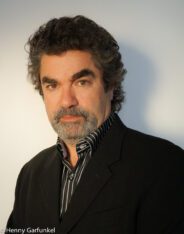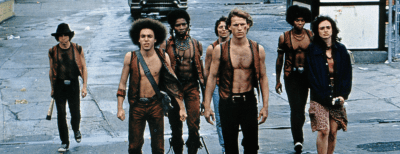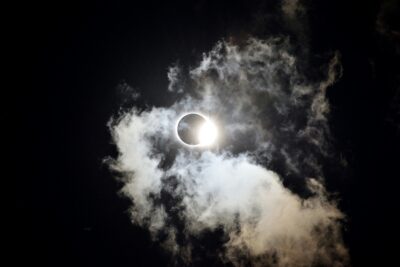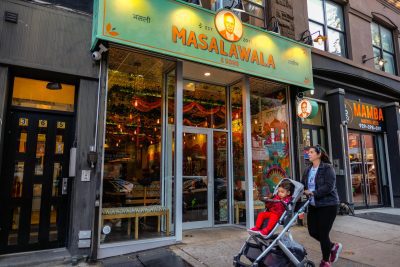Still from 'Book of Shadows: Blair Witch 2,' courtesy Lionsgate
Joe Berlinger’s flop ‘Blair Witch 2’ gets a fresh look at Nitehawk
The cult classic comes to Nitehawk Prospect Park on Monday, October 30, followed by a Q&A with the director
The list of great sequels is short. There’s “The Godfather Part II,” “The Empire Strikes Back,” “Toy Story 3,” “The Dark Knight,” and … we’re sure there’s more but they’re not coming to mind. One of the more infamous sequels, “Book of Shadows: Blair Witch 2,” went from cultural flop to cult classic, and it’s coming to Nitehawk Prospect Park on October 30 with a rare appearance by its director, Joe Berlinger.
“The Blair Witch Project” was such a surprise hit in the summer of 1999 that the studio, Artisan Entertainment, immediately greenlit a sequel. The first movie’s marketing infamously blurred the lines between fiction and reality, and to continue the con, they hired a documentarian to helm the next chapter.
But hiring a documentarian with a social conscience turned out to be a bit like letting a fox into the hen house.
“I try to do responsible storytelling and not just wallow in the misery of others,” Berlinger tells Brooklyn Magazine. “A lot of true crime is just gratuitous, and there’s no larger social justice context or meaning to it.”
Berlinger is the Oscar-nominated director behind Netflix’s popular documentaries about John Wayne Gacy and Jeffrey Dahmer. His 1996 documentary, “Paradise Lost: The Child Murders at Robin Hood Hills,” follows The West Memphis Three, three boys who were accused of triple murder.
Artisan expected the “Blair Witch” sequel to follow in the original movie’s footsteps, but what they got was a social satire of the “Blair Witch” marketing campaign. They intervened by adding blood and gore — which wasn’t even present in the first movie — and restructured Berlinger and co-writer Dick Beebe’s story to reveal the killers before the final act.
The director believes the studio muddied his vision.
“I went on record in The Hollywood Reporter before the movie came out, saying the studio changed my movie and I don’t support it,” Berlinger says.
Despite the outcome, a fanbase grew around the compromised “Blair Witch 2.” Berlinger still managed to skewer manipulative marketing: He did it with a story about “Blair Witch” fanatics who were duped into believing the movie was non-fiction, with deadly results.
Berlinger sat down with Brooklyn Magazine about revisiting his cult classic 20 years later ahead of the October 30 screening.


Berlinger (Courtesy of Radical Media)
Your sequel to ‘The Blair Witch Project’ made $54 million in 2000, but it was pilloried by critics and fans of the original movie.
It was a very painful experience. The sequel was rushed into production, so anything put into the world so shortly after the original would have gotten a lot of hate. Now, with some time I can see that. I’m not saying that my cut of the film would have fared better, but a big problem with the film is the very satirical tone I was going for was muddled by the studio. They changed their mind in the 11th hour and tried to morph it into a traditional horror movie, and that created an incongruent tone of satire and a traditional horror flick.
At least my cut would have been my movie. It didn’t just get bad reviews. People were throwing hate upon hate on it in an era where that didn’t happen. The hate that was directed my way is quite light compared to what happens now on social media.
Why do you think “Blair Witch” fans hated your sequel so much?
I didn’t realize the fans just wanted the mythology to continue. They didn’t care. They wanted their Blair Witch mythology and I underestimated that. I wanted to do something a little more socially responsible, have a little social commentary, and talk about the dangers of blurring the line between fiction and reality because we were coming off a two-decade period where news was sacrosanct. There was a period of time in the ’60s and ’70s when the news division was purposefully siloed from the entertainment division at the major networks. Then we had the explosion of the 24-hour news cycle, the growth of cable, and the O.J. trial taught everyone that news makes money. You saw that profit-making was being injected into the news and there was this blurring of the line between entertainment and reality that concerned me as a documentarian.
How did you respond to the phenomenon of people believing ‘The Blair Witch Project’ was a documentary?
I was literally dumbfounded that people were actually thinking it was real and that the studio marketed it as real. And once the movie came out, the media celebrated the hoax of tricking people into going to the movie for a real documentary. I thought that was troubling. It’s like, why aren’t we criticizing being lied to instead of celebrating it? A good number of people came out of the movie still convinced it was real, even though the actors were on the covers of Time and Newsweek.
Why did Artisan Entertainment ask you, who had never made a fiction film, to make the sequel?
I was pitching Artisan a different movie and during a meeting with their three co-presidents, they told me, “You’re not here for that. We think you’d be a really interesting choice to do the ‘Blair Witch Project’ sequel.” Just the subterfuge of all that … it was my third or fourth time at Artisan pitching my movie and going up the ranks to the top guys. I was stunned that they actually brought me in to pitch me on the sequel to a movie that I had a massive problem with. Like why did the first movie’s shaky camera become shorthand for reality? Documentarians don’t shake the camera around.
So I said, “Look, I’m not sure I’m the right guy, I have these issues.” But they sent me home with three scripts they commissioned, which by the way is against Writer’s Guild rules, but I didn’t like any of them because they continued the found footage conceit. I just thought, “How can you pull the wool over people’s eyes if you’ve already exposed the joke?” Again, I underestimated that’s actually what the fans wanted. In hindsight, I think they picked me because I made a very famous documentary “Paradise Lost: The Child Murders at Robin Hood Hills,” also about murder in the woods, and they wanted to glom onto my reputation as a documentarian to sell this idea that “Blair Witch 2” is a documentary.
So why did you end up directing it?
It was a hard decision because I was being given the keys to the kingdom in an era when documentarians weren’t as popular as they are now. On the other hand, I didn’t like their idea. I told them I didn’t like their scripts and that they were making a mistake by continuing with the found footage conceit. I said if I were making the movie, I would tell a different story. And to my surprise, they said, “Well, what would you do?” I called them back in 24 hours with the idea that “Blair Witch 2” would make fun of the whole idea of making a sequel. I would sequelize not the story, but a sequel to the actual event of this massive indie movie phenomenon in 1999 called “The Blair Witch Project.”
What would that look like?
I said let’s have the reality of this movie be a real thing by acknowledging the reality of the movie’s release, acknowledging that the real town of Burkittsville, Maryland, was overrun with tourists. My story was about obsessed fans of the original movie, who despite the movie being revealed as a hoax, still believe there’s some truth to the Blair Witch. Like a society that can no longer distinguish between fiction and reality, it was the characters I wrote who actually do something terrible and commit these murders but they don’t believe they did it because they’re so deluded.
How did the studio upend your vision?
I was expecting an army of executives sitting around the monitor to oversee our production, but nobody was around. We had a great shoot. Everyone felt we were doing something cool and special. I kept sending dailies to LA, and they kept saying, “Good job, keep it up.” I was surprised at the lack of supervision.
Now it’s August of 2000. The picture is locked. I’m sitting with Carter Burwell, an incredibly talented composer and he’s writing the score, and I get this call from the head of Artisan. They brought in a new marketing person, and they didn’t think there were enough scares in the movie. I’m like, “It wasn’t supposed to be scary. It was supposed to be a satire that takes a terrible turn toward the end of the movie.” So the nightmare began, and they started to change the movie in ways that I didn’t like.
What did they do to the movie?
They wanted to foreshadow murders throughout the movie. I was like, “The whole idea of ‘Blair Witch’ is the murders are off-screen. You don’t see the violence. Why do you want to add it?” The scene where the characters were interrogated by the cops was supposed to be an eight-minute reveal at the end of the movie. They cut it up and sprinkled it throughout the movie instead, but you weren’t supposed to know the kids had any involvement or guilt until the end of the film. All of the scenes where they’re recreating the murders that these kids allegedly did were not supposed to be in the movie at all.
The opening scene over the title sequence where we’re flying over the murder woods originally had Frank Sinatra’s “Witchcraft” to be satirical and funny, but it was replaced with Marilyn Manson’s “Disposable Teens.” The whole thing just felt like a crass, commercial enterprise and they didn’t care about the artistry at all.
Did the experience leave a bad taste in your mouth for fiction filmmaking?
It scared me off of scripted stories, and I didn’t have the desire to do another one until 20 years later when the Ted Bundy movie “Extremely Wicked, Shockingly Evil and Vile” came along. I couldn’t handle doing another fictional project until then because it’s extremely painful to lose control of your own project. I am the author of that work on all of my documentaries. I have final cut. Even when I’m working with Netflix, they give me notes and it’s a collaboration, but at the end of the day, no network has ever made me do something to a project that I didn’t want to do. They respect my craft as a filmmaker.
Why do you think “Book of Shadows” became a cult phenomenon?
My concern about people’s reaction to the first movie is written into my sequel, and by accident, it mirrors people’s concerns about society 20 years later. But today the problem goes beyond entertainment — now it’s hard to find truth in society. I can’t say that I was so prescient that my movie predicted the death of truth, but the fact is that half of this country looks up and says the sky is red when it’s blue, or that half the people in this country believe we have an illegitimate president.
You might also like 


























